 newsitems
newsitems  EU Parliament Rapporteur Costello to EuroFora on EU and USA Food+rehabilitation Aid for Poor People
EU Parliament Rapporteur Costello to EuroFora on EU and USA Food+rehabilitation Aid for Poor People
EU Parliament Rapporteur Costello to EuroFora on EU and USA Food+rehabilitation Aid for Poor People
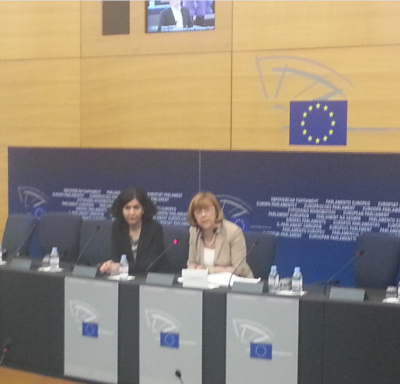
*EU Parliament/Strasbourg/Angelo Marcopolo/- EU Parliament's Rapporteur on the European Aid to the most Deprived People, Irish MEP Emer Costello (ESD), from the Governing coalition currently chairing EU Council, replying to "EuroFora"s Questions, pointed at the fact that the American Federal Government continues to spend some 100 Billions € for Food stamps to the Poor, i.e. apparently much more than the EU, but welcomed also EU's intention to reportedly add Social Re-Integration measures, due to help People get out of Poverty traps, while admitting, however, the fact that several other MEPs and NGOs warn to find adequate ways to prevent any risk of "substitution" of urgently needed, elementary Food Aid, by Employment-related matters, whch are difficult to apply f.ex. to Children, very Old People, irregulatrs, etc, so that a balanced Compromise is yet to be soon decided between MEPs, Commission and Governments (See Infra).
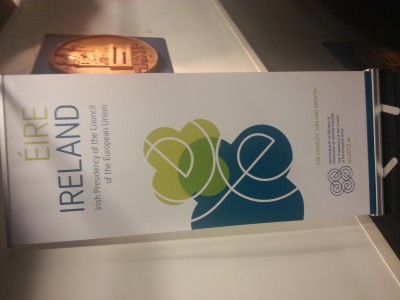
The move came at a Press Conference just after EU Parliament's Employmenyt and Social affairs Committee adopted with a Majority her Report on the creation of an EU "Fund for European Aid to the Most Deprived" People, yesterday (Monday) Evening.
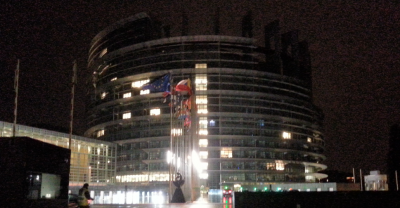
- "EuroFora" had asked Costello, (who is also President of the EU - Palestinian Legislative Council delegation), what was the relevant situation in other developed Western Countries, as, f.ex. in the USA, compared to Europe.
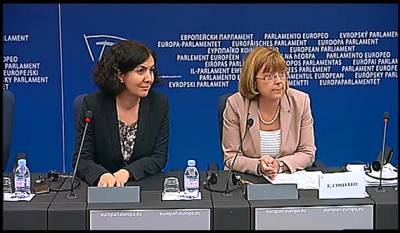
+ As well as for some "more concrete" information on EU's reported intention "not only to help in situations of Extreme Poverty, but also into contributing to get Out of Poverty", as she had highlighted earlier.
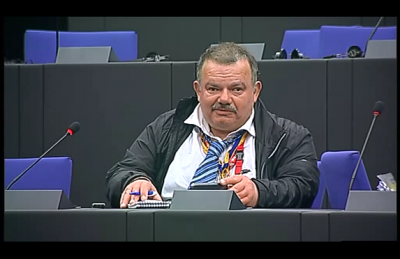
----------------------------
- "You made a reference to the U.S., and, indeed, the U.S. Department of Agriculture spends approximatively a 100 Billions € to help eligible Households in terms of Food Aid" :
- "That's 100 Billions € that they (USA) would spend, and that Funding Stream (still) comes from the Agrcultural Department", (i.e. at a Federal level), EU Parliament's Rapporteur stressed in reply to "EuroFora"s 1st question.
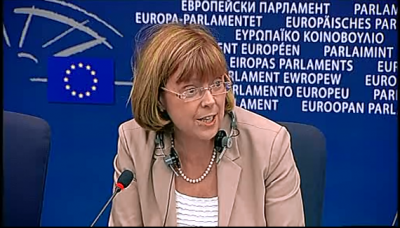
Naturally, to be fair and accurate, EU Countries' Help to extremely deprived People at a National level should also be taken into account in any estimations which would compare the overall Help to extremely Poor People in Europe with that which exists in the U.S., (where, sometimes, also Federated States add to the U.S. Federal Aid, too).
-----------------
+ "On your 2nd Question : One of the main Differencies between this particular proposal, (for the period of 2014-2020) and the previous one (which existed between 2007-2013), is that the previous one came from the (EU) Agricultural Budget line, while, this particular Fund will come now from the Cohesion funds, i.e. it will come from the Social Budget", Costello went on in her replies to "EuroFora".
- "That's something very Important, because one of the issues around the New (EU) Fund is that it has Requirements from the Organizations which are working with the Administraton to find the beneficiaries of this Fund, to actually Engage in what's called "Accompagnying Measures" : That's essentially to contribute into finding ways to Help re-Integrate these People into Society". F.ex., "If they are Homeless, that the(se) Organizations should help them find a Home ; if they are Unemployed, that they help to bring them into a stage where they might participate in a Training course, that is actually funded by the ESF" (EU's Social Fund),etc., she indicated.
=> - "This (New) particular (EU) Program, because it has a Social Inclusion emphasis, differs from the previous program, and we believe that it's something which is actually very important. That's an area where the NGOs,the Charities are actually Welcomed", as it was stressed "when we (EU Parliament) went at Consultation with them", she concluded on this point.
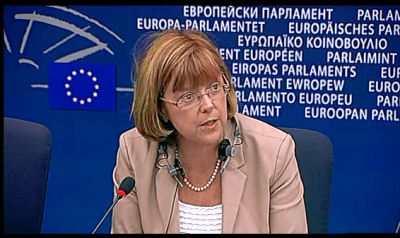
+ At any case, "it's important to know that this is the ONLY (EU) instrument that deals with People suffering from an Extreme level of Poverty, because the ESF funding is normaly for Labor Market interventions", i.e. "it's adressing issues of may be Disadvantaged or Unemployment, rather than Extreme material Deprivaton", EU Parliament's Rapporteur clearly Distinguished.
------------
Meanwhile, it seems true, (as a collegue Journalist evoked immediately afterwards), that some mainstream NGOs warned against what they called "a Substitution effect", particularly "if the programme allows the financing of Social services", because they are afraid that at least some "EU member States will be tempted to finance their own Structural costs, instead of Food hungry people". In this regard, they reportedly "stressed that the program is about the fundamental Right to Food", while, Today, "some 18 Million EU citizens desperately need this", "many of whom are Not even Employable (f.ex. Children, Elderly, Irregular migrants, etc.)". But, "Food Aid is a Bridge to Social and Employment services", which should, normally, keep their own resources.
That's one of the reasons for which the proposal, in its current shape, even if it got a clear Majority in the competent EU Parliament's Employment and Social affairs Committee, nevertheless, it lacked 2 more votes in order to become able to start immediately final Negotiations with EU Commission and EU Member States' Governments at EU Council, so that it will need to be better hammered out inside EU Parliament (probably in concertation with the competent EU Commissioner for Employment, Social Affairs and Inclusion, László Andor), before final decisions in the forthcoming Months, (and while the wider framework of EU's Multi-Annual Financial Perspectives 2014-2020 is still negotiated between MEPs, Commission and Governments, hopefully arriving at conclusions during or after the Summer, as some unverified yet but generally well informed sources indicated later to "EuroFora").
(../..)
***
(NDLR : "DraftNews", as already sent, earlier, to "EuroFora"s Subsribers/Donors. A more accurate, full Final Version might be published asap).
***
Main Menu
Home Press Deontology/Ethics 2009 Innovation Year EU endorses EuroFora's idea Multi-Lingual FORUM Subscribers/Donors FAQs Advanced search EuroFora supports Seabird newsitems In Brief European Headquarters' MAPs CoE Journalists Protection PlatformBRIEF NEWS
- 00:00 - 02.06.2021
- 00:00 - 18.10.2020
- 00:00 - 19.06.2020
- 00:00 - 18.05.2020
- 00:00 - 20.04.2020
- 00:00 - 02.02.2020
- 00:00 - 09.12.2019
- 00:00 - 27.11.2019
- 00:00 - 16.11.2019
Popular
- Yes, we could have prevented Ferguson riots says World Democracy Forum's Young American NGO to ERFRA
- Spanish People Elect CenterRIGHT Majority with 1st Party and Total of 178 MPs (6 More than the Left)
- Pflimlin's vision
- The European Athletic "Dream Team", after Barcelona 2010 Sport Championship Results
- Source Conseil d'Europe à ERFRA: Debatre Liberté d'Opposants à Loi livrant Mariage+Enfants à Homos ?
- Head of BioEthics InterGroup, MEP Peter Liese : "Embryonic stem cell research reaching its END" !?
- Spain: Jailed Turkish Terror suspect with Explosive,Drones,Chechen accomplices stirs Merah+ Burgas ?
- UN Head Ban Ki Moon at CoE World Democracy Forum : - "Listen to the People !"
Latest News
- Test Photos (f.ex.+ Invit to EU + Korea Peace meeting)
- EUOmbudsmen Conference 2022: Digital Gaps affect People's Trust threaten EF Project on EU Future ?
- French Election : Black Out on Virus, but Obligation for Fake 'Vaccines" Challenged
- Both French Presidential Candidates point at "Humanism" in crucial times...
- France : Zemmour = Outsider may become Game Changer in Presidential + Parliamentary Elections 2022
Statistics
Visitors: 61777000Archive
Login Form
Other Menu
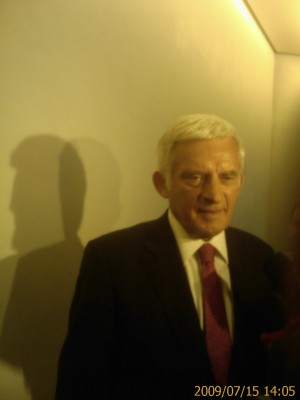
Speaking exclusively to "EuroFora", the New EU Parliament's President, former Polish Prime Minister, ChristianDemocrat/EPP MEP Jerzy Busek, welcomed proposals by EuroFora about innovative ways for EU Citizens to attend EU debates before important final decisions which affect people's lives.
- "We (EU Parliament) must be transparent", Buzek stressed from the outset. "We must have clear answers also for delicate questions. If we don't touch a problem, you must know why, and when shall we decide in the nearest future".. "Because "we (EU) must think about Europeans, first of all : They don't understand well what is going on in the EU. So, it's our duty to inform them, to make discussions here more interesting".
"EuroFora" congratulated President Buzek for the anouncement he made, from the 1st day of his election in Strasbourg (on Tuesday, 14 July 2009), on his intention to make transparent debates, exchanges of views, etc. before the final adoption of decisions in EU Parliament's Plenary, when issues are evolving inside Committees, (See earlier publication).
And we reminded, in this regard, that "EuroFora" has been advocating a project for EU Citizens' active involvement in pluralist EU debates before important EU decisions, since more than a Decade : 1997-2007+
- "Thank you. We (EU Parliament), indeed, have exciting debates", Buzek replied. But, in practice, "without a possibility for our Citizens to see them, not even by the Press, the Radio or TV, etc., because it is in Committees", he regreted.
- "But, they (i.e. Media, Citizens, etc) might interact with you, with MEPs, etc, May be we can imagine something", "EuroFora" proposed.
- "Yes, (but) it needs, a quite new idea", Buzed observed.
- "Why not through some innovations ?", "EuroFora" suggested.
- "Precisely, "EuroFora" has such a project, since more than a Decade (1997-2009), to use new technologies for public debates before major EU decisions are taken", we reminded.
- "If you have such proposals, please come to us, come to us. We must" do something, agreed the new EU Parliamen's President.
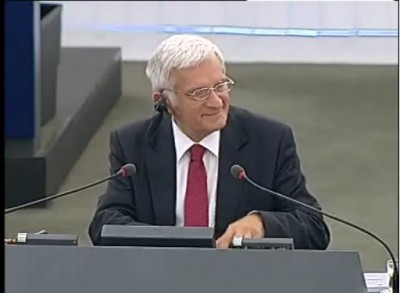
For that purpose, obviously information and debates are valuable, but purely instrumental, procedural means which can help focus on, and highlight a substantial content, attractive to EU Citizens, which needs to be determined by other, political, and not mediatic factors.
Buzek spoke about the urgent need to overcome the Global Economic Crisis, the struggle for Human and Civic Rights, Democracy, etc., the Eastern Partnership, links with Russia, strategic partnership with USA and emerging countries, etc.
But he also used (while speaking both to "EuroFora" and other Media) the expression : "The Europeans", for EU Citizens. This points right towards what several important EU leaders (including French President Sarkozy, German Chancellor Merkel, etc) have started to highlight particularly during the recent years : That there is a vital need, and an historic opportunity, for the development of a European Conscience, to stimulate e renaissance of a European Identity able to attract Popular support, for the EU to become a strong player in a Multopolar World : In other words, the revitalisation of a project for a "Political Europe".
By a coincidence, this was indirectly but surely reminded, earlier in Strasbourg, by another ... Busek (this time with a "s") :
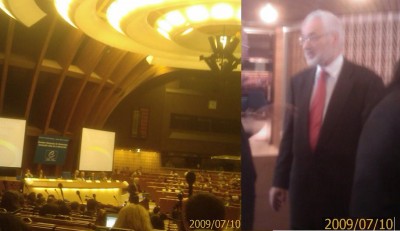
Speaking to more than 650 participants from CoE's member countries, at the conclusion of the 2009 Summer University of its Political Schools, Erhard Busek, (with an "s"), former vice-Chancellor of Austria and EU Coordinator for South-Eastern Europe, pointed at the current need to revitalize Europe's "Identity", forged by Greek philosophy and Roman Law, Christian values and Enlightment's ideas, etc. through the ages.
- "We have almost the same name with Jerzy Buzek (EU Parliament's new President, who is a former Polish Prime Minister), because both our Families come ...from the same village, located at the Heart of Europe, which was often shared between Poland, Germany and the Czech Republic. But my family emmigrated a long time ago to Austria, while Jerzy Buzek's family remained in Poland", explained f. vice-Chancellor Erhard Busek to "EuroFora".
An astonishingly concrete and simple example of European Integration from the grassroots : Starting by EU Citizens, i.e. those "Europeans", that EU Parliament's new President, Jerzy Buzek (this time with a "z"), wants to bring alongside MEP's decision-making proces, (according to "EuroFora"'s main idea : Comp. supra)...


















